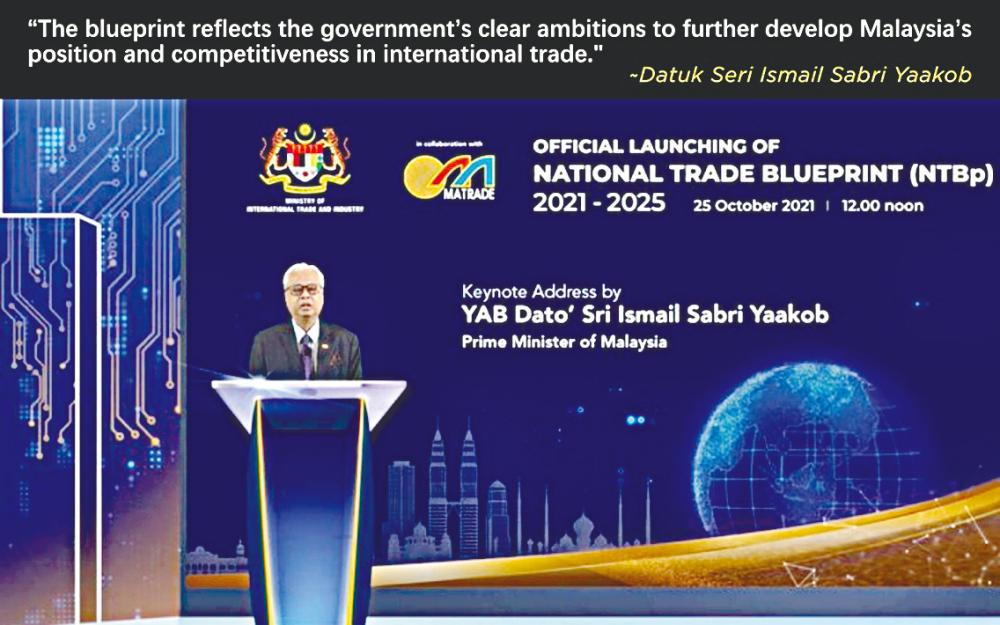PETALING JAYA: The National Trade Blueprint 2021-2025 (NTBp) formulated by the Ministry of International Trade and Industry (Miti) and Malaysia External Trade Development Corp (Matrade) will address the structural changes needed for the export sector to thrive, according to Prime Minister Datuk Seri Ismail Sabri Yaakob.
He said this will be achieved through the strengthening of trade facilitation, logistics, standards conformance, market access, sustainability, digitalisation and technology, investment and branding.
“The blueprint reflects the government’s clear ambitions to further develop Malaysia’s position and competitiveness in international trade,” Ismail Sabri said in his keynote address at the launch of the blueprint today.
“More importantly, this blueprint is set to supplement the policies outlined in the 12th Malaysia Plan (12MP) towards meeting its targets with clear, actionable, and focused recommendations.”
Nonetheless he acknowledged it should not just be about improving trade numbers quarter by quarter, but something more meaningful.
The prime minister believes the blueprint should act as a catalyst to identify Malaysia’s future sources of competitiveness, based on an informed understanding of the global supply and demand market with a uniform collaboration between the government and the private sector.
He said the blueprint will also affect the rakyat in a positive manner, besides benefiting the business community.
“Besides advocating an economic agenda that is aligned with the nation’s social landscape, the blueprint’s key thrusts and recommendations strive towards inclusivity, fair distribution of wealth, narrowing of inequality gaps, elevating livelihood of Malaysians, as well as providing positive impacts for the nation through higher income generation,” Ismail Sabri explained.
Against the current backdrop, he noted the Covid-19 pandemic has wreaked havoc on global trade and economic well-being, delivering a hit to industry’s confidence and affecting Malaysia’s export sector. In response, the government has introduced numerous support, recovery and reform initiatives to safeguard the economy and ensure survivability of businesses, particularly small and medium enterprises.
For international trade, Ismail Sabri stated that the authorities’ immediate priority is to sustain exports and assist local companies in continuing export-related activities. “Incidentally, Covid-19 brought about fresh, untapped opportunities to expand our export footprints due to growing external demand.”
He said the rapid economic globalisation has posed new challenges and notably accelerated advances in science, technology, and innovation, including digital technology, demographic shifts, trends and socio-economic transformations. Subsequently, this digital wave has driven social changes, influenced policies, and changed consumer behaviours.
The prime minister stated that the government has identified sustainability as another important aspect to trade.
“We have long recognised the importance of sustainability in preserving the environment. Adoption of economic sustainable practices will ultimately enhance competitiveness and ensure business continuity of exporters.”
The NTBp has identified eight strategies to improve Malaysia’s exports; the strengthening of the export ecosystem by removing business constraints and export bottlenecks to smoothen the export process; the uplifting export through the strengthening of SMEs production capacity and capabilities to enter the global value chain; as well as elevating the country’s export strength by extending support to existing sector with high potential to groom new champions across the supply chain.
The blueprint also aims to harness growth through e-commerce by strengthening competitive advantage by supporting industry to scale up, increase productivity and internationalisation; facilitating and widening market access via increased engagement with key markets; and promoting Malaysia’s brands and products to increase their visibility in the regional and international market.
In addition, the NTBp aims to drive growth through investment and diversification as it would be critical to navigate the uncertainties in the global trade environment; and encourage the adoption of sustainable good practices and standards.













